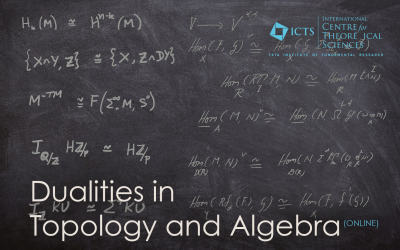Duality phenomena are ubiquitous in mathematics, particularly in topology and algebra. Classical instances on the topology side include Poincaré duality and Alexander duality, which give a relation between homology and cohomology of spaces. These results have interesting consequences after localization, for example in rational homotopy theory. In stable homotopy theory (more precisely, in the category of spectra), Atiyah duality and Spanier Whitehead duality are analogous results. In the realm of algebraic geometry and commutative algebra, an outstanding example is Grothendieck's duality theory for schemes and its local analogue.
While there is a plethora of dualities, there are also unifying perspectives that allow us to view them as different manifestations of the ‘same’ phenomenon. For example, Grothendieck duality in local algebra and Poincaré duality can both be seen as different avatars of a duality theorem for spectra, in the sense of homotopy theory. There are analogous connections between Brown Comenetz duality and Matlis duality, and between Spanier Whitehead duality and local duality for Gorenstein rings. The motivation for doing so is that it allows us to bring to bear techniques and intuition gained in one area to address problems in others, and to gain new perspectives on familiar results.
The goal of the lecture series planned as part of this ICTS workshop is to introduce diverse theoretical frameworks which have been developed to formulate and understand duality phenomena. There will be 24 lectures over the span of two weeks along these lines in both algebra and topology.
Eligibility criteria : Graduate students in Algebraic Topology or Commutative Algebra
 icts
icts res
res in
in
- Talks
- Other links


